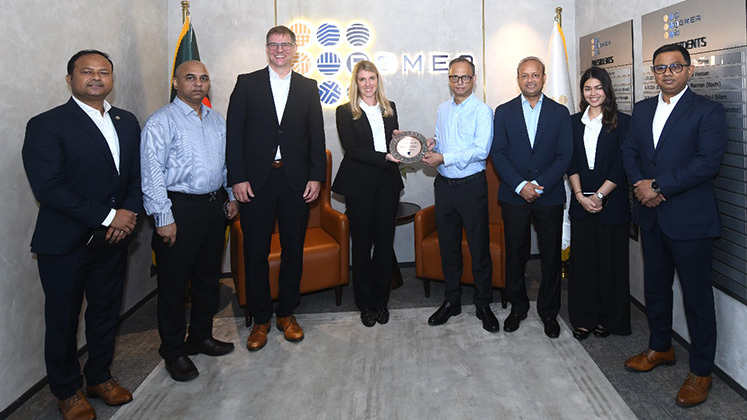
BGMEA President Mahmud Hasan Khan met with a high-level team from Hohenstein Group (Germany), a global player in textile testing, certification, research and development, at the BGMEA Complex in Dhaka.
Dr. Md. Kamruzzaman (Managing Director, Hohenstein Laboratories Bangladesh Ltd.), Julia Mecheels (Advisory Board Member) and Dr. Stefan Droste (Managing Director and Group CEO) made up the delegation.
The two organisations talked about a number of important projects intended to improve Bangladesh’s readymade garment (RMG) industry’s sustainability and competitiveness. The promotion of the MADE IN GREEN logo, a traceable product mark affixed to leather goods and textiles made in safe, ecologically friendly facilities using tested materials, was at the centre of these efforts. The MADE IN GREEN label provides transparent supply-chain visibility with a unique product-ID/QR code, allowing purchasers or consumers to track where and how things were created. It is issued based on facility certification (STeP) + product testing (STANDARD 100, etc.).
Mahmud Hasan Khan emphasised the necessity of a single code of conduct for social and environmental compliance throughout the garment supply chain, claiming that this standardisation would lessen the ‘audit fatigue’ that suppliers endure from going through several overlapping evaluations.
Additionally, he made a significant technical request on whether Hohenstein could offer such services locally in Bangladesh using DNA testing of fabrics to confirm the origin of the fibres. In order to make sustainable certification more accessible and cheap for the nation’s manufacturing base, he also urged Hohenstein to think about lowering the cost of STeP certification for BGMEA-member enterprises.
The partnership takes place at a time when buyers and regulators are putting more pressure on Bangladesh’s RMG industry to demonstrate stronger sustainability credentials, not just in terms of labour practices and factory safety but also in terms of environmental performance, resource use and supply-chain transparency.
Business implications include: the push for a unified code of conduct which may streamline supplier compliance burdens, reducing duplication of audits and thereby lowering cost and complexity for factories—a positive move for competitiveness; if Hohenstein grants BGMEA’s request to lower STeP certification costs, more Bangladeshi suppliers are likely to participate in the MADE IN GREEN program, which could open doors to higher-value orders from sustainability-focused buyers; the investigation of fabric-DNA testing indicates a growing emphasis on raw-material traceability in Bangladesh; given growing customer demands, implementing such sophisticated verification technologies may put Bangladeshi suppliers at the forefront of transparency; by strengthening Bangladesh’s local infrastructure for testing, certification and R&D, Hohenstein’s increased presence in the country (through its local laboratory and services) lessens the need for foreign outsourcing, speeds up turnaround times and may even result in cost savings.
In the upcoming year, a new generation of Bangladeshi factories may apply for the MADE IN GREEN mark and enroll in STeP certification if the relationship continues. The next stage of talks will probably include BGMEA’s support for cost-cutting measures. This represents a change for Bangladesh’s clothing industry from just compliance-driven operations to proactively branding sustainability and traceability, in line with changing regulatory frameworks and global buyer expectations.






